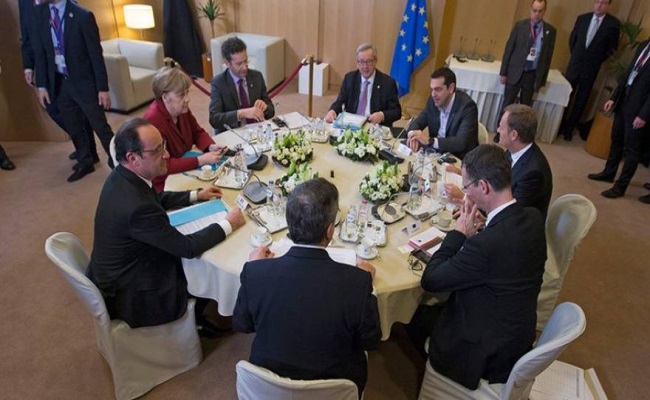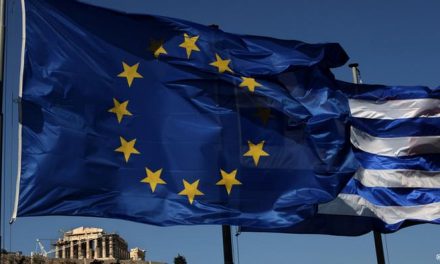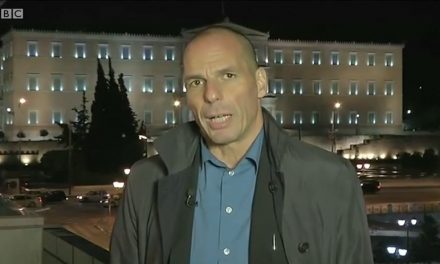Athens needs €86 billion but may get there only with a major fudge.
By Pierre Briançon and Matthew Karnitschnig, Politico
After promising up to €86 billion to finance a third bailout for Greece, the country’s creditors now just have to find the money.
So far, the numbers don’t add up. The figures officially mentioned since Athens and other eurozone governments clinched a deal July 13 don’t square with the official statements of the signatories themselves.
The reason is politics.
The International Monetary Fund, which contributed about a third of the funding of the two previous Greek bailouts in 2010 and 2012, has yet to say whether it will put fresh money into a third. The IMF won’t go in without debt relief. Eurozone governments won’t go in without the IMF, but want debt relief to be only “considered after the first positive completion of a review.”
Either someone has to give in, or Greece’s creditors must come up with a major fudge to square their impossible circle.
The IMF can only lend to a country if it deems its debt sustainable. Asked on July 17 whether the deal agreed by Greece and its eurozone creditors a few days before would be viable without debt relief, IMF managing director Christine Lagarde said: “The answer is unequivocal: No.”
Germany and a few other eurozone governments refuse to talk about debt relief for now. Chancellor Angela Merkel said in a lengthy interview Sunday on German public television that the only form of debt relief Berlin will consider is a re-profiling of Greece’s obligations by extending maturities and lowering interest rates.
Merkel pointed out that creditors have previously taken such measures to relieve Greece’s debt burden and are willing to do so again. But she stressed that such a step, as outlined in the deal reached last week with Greece, could only come if Athens passes its first bailout review, expected in November.
“These steps are included in the mandate and we can discuss them, but only once Greece has successfully completed the initial review of its program, not now, only then,” Merkel said, reiterating her opposition to an upfront “haircut” on Greek debt.
The chancellor was merely reiterating the European Council’s July 12 statement, but the fact that she took such a definitive stance on the issue in a primetime television interview suggests that she will not back down on this point.
At the same time, on the insistence of Germany and its closest eurozone allies, the same statement insists that the IMF contribution “is a pre-condition for the Eurogroup to agree on a new program.”
The Fund was called in to take part in Greece’s financial rescue in 2010 on the insistence of Merkel, who thought the institution’s reputation would lend credibility to the conditionality attached to the bailout.
So how do you find as much as €86 billion in this difficult context?No ‘ifs’ or ‘buts’
Klaus Regling, managing director of the European Stability Mechanism — the eurozone’s bailout fund — said last week in an interview on German television that it would contribute “perhaps €50 billion” to the bailout.
About half that amount, according to the July 12 statement of the European Council, will be devoted to a direct recapitalization of Greece’s banks, which reopened Monday after remaining closed for two weeks.
Were Greece’s two former bailouts to serve as a template, the IMF would then put some €25 billion into the third one. It is unlikely to do so if it doesn’t get firm assurances about some serious debt restructuring. And even then, the IMF’s board, which had grown restive in the last years about the Greek bailouts, is likely to resist the possibility of putting fresh money into the exercise’s third iteration.
Some €15 billion which remains due on the IMF’s current Greek bailout can possibly be counted in. That program, unlike the eurozone assistance which expired on June 30, was only due to expire in March 2016. The IMF can resume disbursing the aid, now that Greece has paid its arrears to the Fund.
According to an IMF insider, there is “next to no chance” it would agree to put up €10 billion more for Greece without a firm debt relief commitment.
“No ‘ifs’ or ‘buts’ there,” said the source.
Given that neither Europe nor Washington wants the deal to collapse, the major fudge is the likely outcome.
That, according to a eurozone official, could come when a review of the program comes up in the fall. In that scenario, the IMF wouldn’t commit new money right away. In lieu of a formal assessment, the creditor institutions — experts from the European Commission, the IMF and the European Central Bank — would simply review the steps Greece has already taken in order to open the bailout talks.
Greek Prime Minister Alexis Tsipras muscled a long list of tentative reforms demanded by creditors through the Greek Parliament last week.
If Tsipras proves consistent in the next three months, talks about a debt restructuring could then take place, providing cover for the IMF to take part in the third bailout.
That ‘fudge scenario’ — which has no guarantee of getting Merkel’s approval — would still only make some €75 billion available to Greece, leaving a €7-to-11 billion shortfall over the three-year period. The country’s creditors made it clear they expect Greece to contribute to its financing needs — by running a primary budget surplus from next year on, or, for example, by speeding up its privatization efforts.
With some creative public accounting, and at the risk of stretching further the bailout’s already-weak credibility, they could then make the maths finally add up.



















